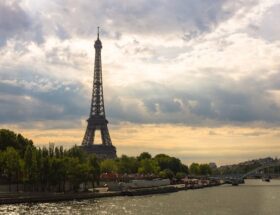Thanks for joining us at GertieBlu, where we explore the pressing issues facing our environment and discuss ways to create a cleaner, healthier world. Today, we’re exploring into a topic that impacts all of us, yet can feel distant because it’s invisible: air pollution. Though we may not always see it, the air we breathe directly affects our health, the climate, and the planet’s future.
Over the last few decades, the landscape of air pollution has shifted dramatically. While we’ve made significant progress in reducing emissions, there’s still a long road ahead. The story of air quality is one of transformation, but also of an urgent call to action. Let’s take a look at where we’ve been, how far we’ve come, and what more we can do.
The Journey So Far: How Air Pollution Has Evolved
In the mid-20th century, air pollution was a visible, palpable problem. Thick smog blanketed cities like London, New York, and Los Angeles. Factories belched out pollutants, and vehicles ran on leaded gasoline, releasing toxins into the air. Industrialization, while driving economic growth, came with a steep environmental price.
The health impacts were staggering. Airborne pollutants were linked to respiratory diseases, heart problems, and premature death. Major events like the Great Smog of London in 1952, which killed thousands, forced the public to reckon with the danger in the air.
By the 1970s, change was on the horizon. Governments began enacting stronger environmental policies. In the U.S., the Clean Air Act of 1970 set a new standard by regulating emissions from both industrial sources and automobiles. This act, along with the establishment of the Environmental Protection Agency (EPA), led to a dramatic reduction in air pollutants like sulfur dioxide, nitrogen oxides, and particulate matter.
Progress on a Global Scale
The air quality improvements in developed nations have been significant. According to the EPA, aggregate emissions of the six common pollutants have decreased by 78% between 1970 and 2020. Similar progress has been seen in Europe and other parts of the world. Cities that once suffered from dangerous levels of smog now enjoy cleaner skies and healthier populations.
However, the problem hasn’t disappeared—it’s shifted. While many developed nations have taken strides to reduce emissions, countries undergoing rapid industrialization, such as China and India, have seen a rise in pollution. Cities like Delhi, Beijing, and Jakarta frequently experience hazardous air quality levels, posing a major public health crisis for millions.

Where We Stand Today
Globally, air quality remains a pressing issue. Pollutants like fine particulate matter (PM2.5) and ground-level ozone continue to pose significant risks. The World Health Organization (WHO) estimates that 7 million people die prematurely each year from exposure to polluted air. Even in areas where visible smog is less of an issue, air pollution remains a silent killer.
And while we’ve cut emissions in some sectors, new challenges are emerging. The rise in wildfires, driven by climate change, is pumping vast amounts of particulate matter into the atmosphere. Urban sprawl and transportation emissions also contribute to the problem, and while electric vehicles are on the rise, the world still runs on fossil fuels.
What More Can We Do?
So, what’s next? How can we continue to clean the air and make sure future generations inherit a healthier planet? Here are some critical steps we can take:
1. Transition to Renewable Energy
One of the most effective ways to reduce air pollution is to move away from fossil fuels. Solar, wind, and hydropower provide clean alternatives to coal and oil. While the transition is underway, it needs to accelerate. Encouraging investment in renewable energy, both at the governmental and corporate levels, is crucial to a cleaner future.
2. Promote Electric Vehicles
Transportation accounts for a large portion of air pollution. As electric vehicles (EVs) become more affordable and charging infrastructure improves, more consumers can switch from gas-powered cars. Governments can support this shift through incentives, subsidies, and investments in EV infrastructure.
3. Implement Stricter Regulations
While we’ve made progress, many countries still lag behind when it comes to air quality standards. Governments must enforce stricter regulations on industries, especially in developing regions. The Paris Agreement and other international accords are a start, but countries need to commit to tangible, enforceable targets for reducing emissions.
4. Support Reforestation and Urban Green Spaces
Trees act as natural air filters, absorbing pollutants and releasing oxygen. Supporting reforestation projects and creating more urban green spaces can have a dual benefit—cleaner air and combatting climate change. Planting trees in cities, especially in areas with high pollution levels, can reduce harmful particulate matter and make urban living healthier.
5. Raise Public Awareness
Education plays a vital role in tackling air pollution. Many people still underestimate the risks of poor air quality, particularly in areas where pollution isn’t immediately visible. By increasing awareness, we can inspire individuals to reduce their own carbon footprints, pressure local governments for better air quality policies, and make more eco-friendly choices in everyday life.

Looking Ahead: The Road to Cleaner Skies
We’ve come a long way since the days of choking smog and leaded gasoline, but the fight against air pollution is far from over. In many ways, it’s more urgent than ever, especially as climate change amplifies environmental challenges.
The good news? We have the tools, technology, and knowledge to make a difference. Now, it’s about accelerating action—by transitioning to cleaner energy, driving less, planting more trees, and pushing for stronger policies. Every small change helps.
At GertieBlu, we believe that by coming together, we can create a world with cleaner skies, healthier people, and a brighter future. Each of us has a role to play in reducing pollution and protecting our environment.
Until next time, stay curious and keep fighting for a healthier planet!









